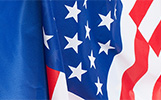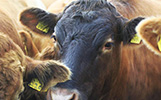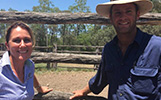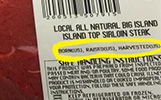| US Beef Industry Reiterates Support for Tariffs Against EU Over Hormone–Treated Beef Ban 
Ingrid Mezo, Food Chemical News via AgraNet (subscription) | February 16,2017
TThe U.S. beef and veal industry urged the U.S. Trade Representative (USTR) at a Feb. 15 hearing to reinstate retaliatory tariffs on a range of products from the European Union over the EU's ban on hormone treated U.S. beef.
"Beef Will Be the Big Loser"– CETA Reactions 
Amy McShane, Irish Farmers Journal | February 16, 2017
Farm organisations have reacted to the approval of the Comprehensive Economic Trade Agreement (CETA) by the European Union on Wednesday. While the trade deal divided opinions among Irish MEPS, farm organisations have also expressed disappointment at the approval of CETA, which will provisionally come into effect from April this year.
Prior to the passing of the trade deal, the Irish Cattle and Sheep Farmers' Association (ICSA) president Patrick Kent warned it would be problematic for Ireland, adding that 5% of Canadian farmers produce nearly half of Canada's food produce.
Reacting to the news, the ICSA president said: "Beef will be the big loser, with 50,000t of ultra–cheap Canadian beef coming into the European market," adding that it will be disastrous for the beef sector.
IFA president Joe Healy also expressed concerns for the beef sector: "Our concern remains that Canadians will target the high–value market and this could have a disproportionate impact on prices in the beef and pigmeat sectors.
Processors and Producers Move On the Organic Beef Demand Boom 
Shan Goodwin, North Queensland Register | February 16, 2017
Australia is in a prime position to make the most of red hot consumer demand for organic beef in the United States and Europe but industry leaders say a close eye has to be keep on ensuring growth is well planned.
JBS Australia, the country's largest beef processor, has just announced it will kick off full production of a certified organic beef program next month, with the US firmly in its sights.
JBS says it is looking to "aggressively grow" production numbers for its organic brand, Acres, and it sees domestic market demand for the niche article as also having significant potential.
Beef Markets ––– Wendy's Love Letter to Beef Producers 
Virginia Harris, DTN The Progressive Farmer (registration) | February 20, 2017
Fresh, never frozen, North American beef. That's Wendy's mantra. The fast–food chain may not be exclusive with beef, but the company sure makes its preference known. DTN had a recent sit–down with vice president of marketing, Carl Loredo to hear about their efforts to prioritize beef.
"The biggest focus for us this year is our fresh North American beef," Loredo said. "There was this realization we have been talking about our fresh beef, since 1969, but we weren't so sure consumers were hearing us." There was a big opportunity to talk about that because it makes a difference in terms of how the hamburgers taste.
"We're gaining ground on two fronts. The first in terms of what consumers know and what we've seen in terms of overall business," he explained. "I think the idea of so fresh it never has to be frozen helps people understand, 'Oh I guess it must be from somewhere around here,'" Loredo said.
He also pointed out Wendy's partnership with NCBA in incorporating the organization's Beef Quality Assurance protocols into the company's supply chain as a way to ensure transparency toward consumers and sustainable beef production.
Indonesia–NZ Trade Beef Reignites
Radio New Zealand | February 21, 2017
The WTO last year upheld complaints from both New Zealand and the United States about Indonesia's restrictions on importing food and animal products.
Trade Minister Todd McClay said he was extremely confident New Zealand has a strong case. "It is very common for WTO rulings of this nature to be appealed and we had expected this action."
The barriers, which include sale restrictions, restrictive licence terms and a requirement to buy domestic products, are estimated to have cost New Zealand's beef industry up to $1 billion in lost trade.
"The government remains committed to opposing any unfair impediments to trade and will continue to fight for the rights of our exporters to fairly access markets in all parts of the world."
Former Prime Minister John Key raised the matter when he visited Indonesia last year and said at the time both countries wanted to resolve the dispute. In the end, however, they were unable to reach a deal.
Tyson Foods Debuts New Vision, Logo
KARK Arkansas Matters | February 21, 2017
A new Vision Has Been Announced for Tyson Foods. The Springdale–based company supplies retail and foodservice customers throughout the United States and about 115 countries.
A news release issued on Tuesday announced that Tyson Foods President and CEO Tom Hayes had outlined his vision for how the company will shape the future of food. Tyson is the market leader in chicken, beef and pork as well as prepared foods, including bacon, breakfast sausage, turkey, lunchmeat, hot dogs, pizza crusts and toppings, tortillas and desserts.
Tyson Foods also is deepening its commitment to a more sustainable food system. The company will innovate to develop new solutions that deliver healthier food, healthier animals, healthier workplaces and a healthier environment. In this commitment, the company sees a long–term opportunity to grow and increase profits sustainably. Tyson Foods' holistic sustainability plan includes commitments.
Tomi Lahren's "Alternative Facts" on COOL 
Bridget Beran, Drovers | February 24, 2017
onservative political commentator Tomi Lahren is speaking out about Country–of–Origin–Labeling again. Lahren, a native South Dakotan, currently hosts Tomi for TheBlaze on line. In her recent "Final Thoughts" commentary, she reiterated her view point that the elimination of COOL is detrimental to the American rancher. But what are the facts behind her statements? Watch :35 video HERE. | |
